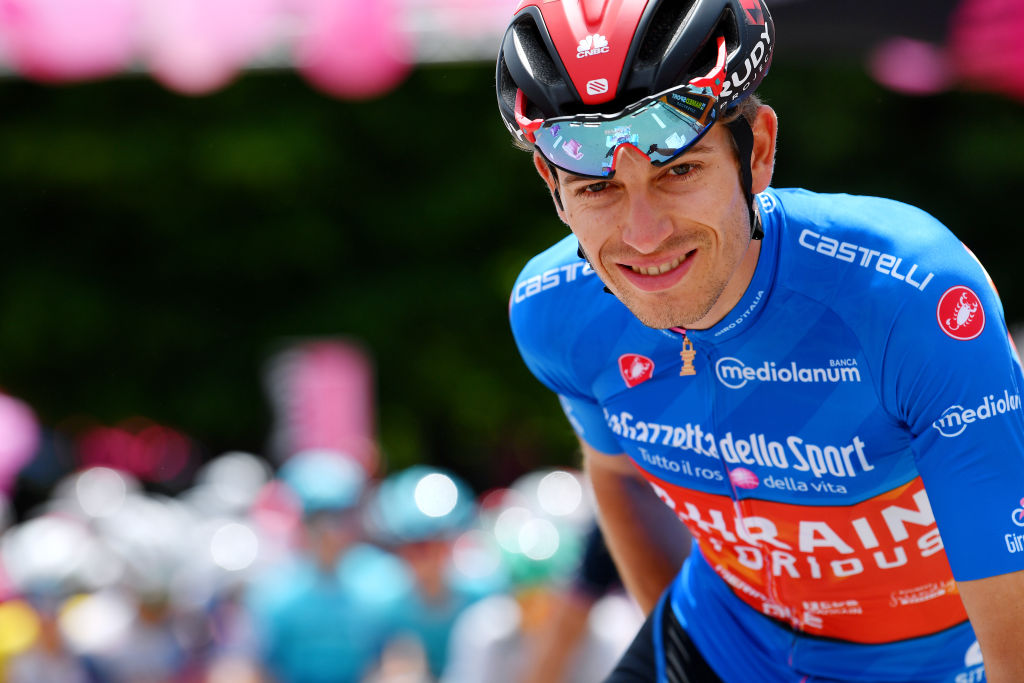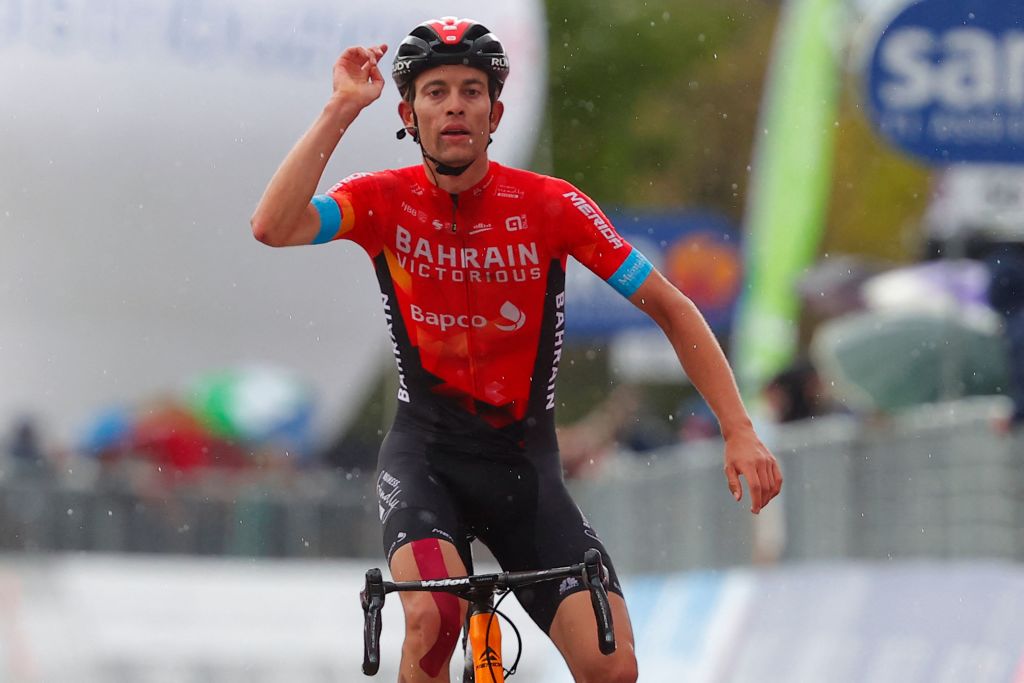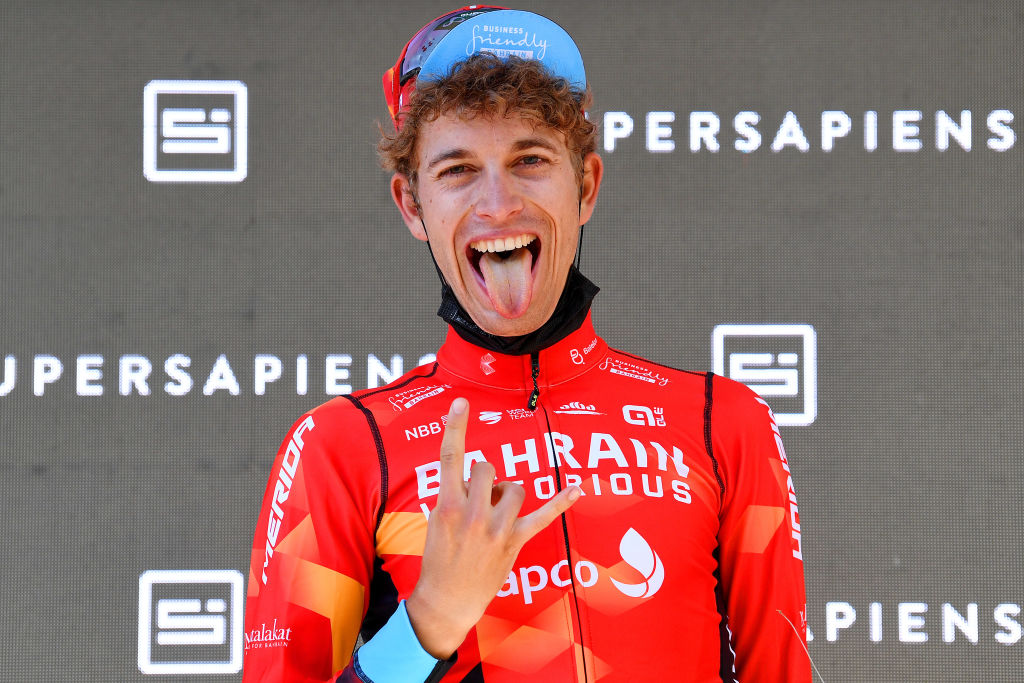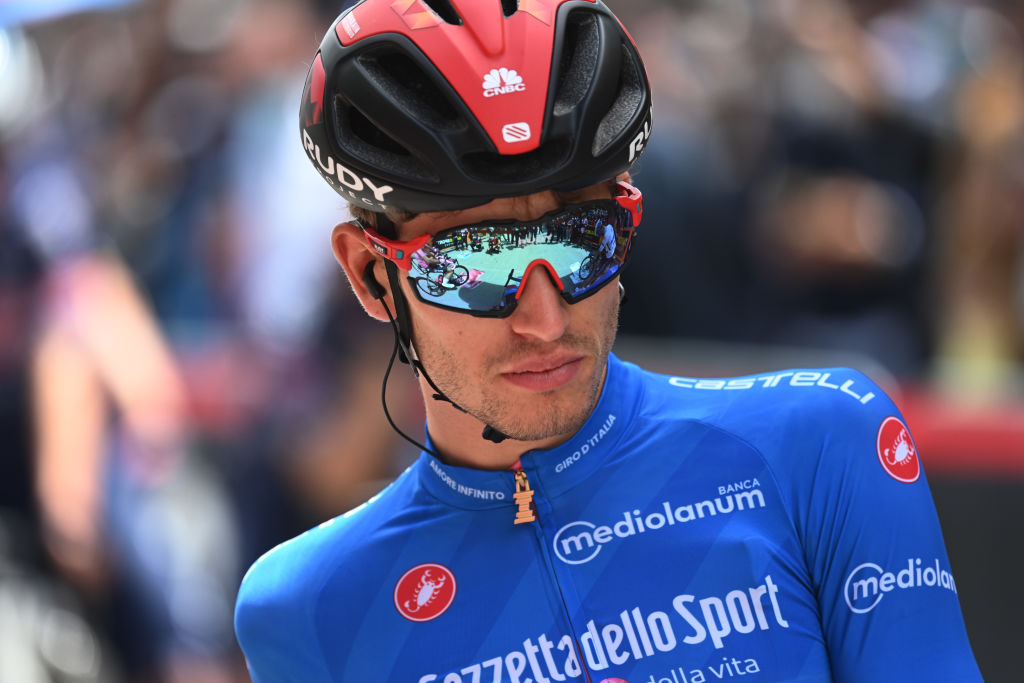Gino Mader: Being in the clean with oneself
Swiss rider on the ethical conflicts of riding for Bahrain, his environmental charity work, and his shot at the Tour de France

The last time I saw Gino Mäder was in Santiago de Compostela, where, after a long journey of becoming, he crossed the finish line of the final stage of the 2021 Vuelta a España in the white jersey and fifth on GC. The playfully dramatic bow he took on the podium in the shadow of the great cathedral marked a satisfying conclusion to the young Swiss’ 2021 season, his first with Bahrain Victorious and one which could be easily read as his coming of age.
It began with that oft-discussed (to his chagrin) disappointment in Paris-Nice and found ascendency with stage wins in the Giro d’Italia and in the Tour de Suisse. But it is undoubtedly the Vuelta where Mäder, 24, truly came into his own.
During those three weeks, Gino Mäder went from "just a domestique" for Mikel Landa (and later for Jack Haig) to expressing a desire to snatch the best young rider's jersey from the hands of Egan Bernal, a feat that would come to fruition during that fateful stage 20 raid that saw the entire ranks of the GC riled.
At the time, I had been documenting Mäder’s rise for a profile in Procycling, and can still remember that penultimate stage well, down to the smell of the pine needles burning in the summer heat. Even though he was clad in victorious white, Gino told me, with some bashfulness, that he was "still a domestique for Jack". There was an element of humility to this, for he had, in fact, become much more than that, and he and everyone else knew it.
Now, he’s back in Spain - this time with the rest of Bahrain Victorious at their training camp. When he logs on to the Zoom call (one cannot be too cautious in the wake of so many recent coronavirus cases) he’s sporting both a new moustache and a familiar smile. Behind him in the small hotel room, the Spanish sun begins to descend in slices as cycling clothes dry on a wall-mounted rack.
It takes us little time to get reacquainted, and right away we tackle the elephant in the room: "I heard a rumour that you’re going to the Tour de France," I say, and he laughs.
"I heard that rumour as well."
Get The Leadout Newsletter
The latest race content, interviews, features, reviews and expert buying guides, direct to your inbox!
"Well, how do you feel?"
His glee is palpable. "The first Tour, it’s exciting isn’t it? I remember some years back when I was racing the Tour de l'Avenir and one of the captions under my Instagram picture was 'looking forward to racing again in France, maybe at the big brother'. And now this is coming true."

What Mäder’s Tour de France role will look like within a Bahrain Victorious team boasting both of their prior-season Grand Tour podium winners (Jack Haig and Damiano Caruso) is, at this point, ambiguous.
"Obviously we are gonna have an incredibly talented team there, which is great, but which kind of leaves me still having to find a place within that team," he concedes.
However, he doesn’t seem to be too worried, and he shouldn’t be. Bahrain Victorious, though at times seemingly nebulous, have this past season proven to be remarkably adaptable if not downright resilient. In all three Grand Tours they participated in, their prime GC candidates either crashed out or their campaigns collapsed, and yet they were able to secure a combination of podiums, stage wins, and classification jerseys through a strategy of aggression and cunning risk-taking.
In the blunt words of their technical director Vladimir Miholjević from an interview with Procycling last year: "[Cycling] should be emotional. [For] the spectators that are watching a cycling race, it should be a thriller book, no? It should not be a phone book."
This elastic environment perhaps explains why, in the face of his upward trajectory, the raised expectations of being a protected leader don’t seem to weigh down Mäder much.
"I honestly don't feel like there's more pressure from the team. Obviously they want to see me succeed, but I think in the end, nobody really wants it more than I do myself. I tend to be really hard on myself, self-critical," he admits.
"Being at the race as a leader, or co-leader, it just means that the more [the team] believes in me, the more I also kind of believe in myself. If they send a team just to support me, obviously there has to be a reason. It’s more security, more reassurance than pressure."
The presence of Jack Haig in particular is cited as an additional comfort, owing to their similar riding styles and their mutual goals. "We can really work well together," Gino says of Haig, adding, with a wink, "hopefully this time, not always me for him, but let's see."
An openness towards co-leadership is a good attitude to have, considering Mäder’s signed up for a full program of stage racing and thus plenty of opportunities to hone his emerging general classification craft. His calendar begins with Ruta del Sol, another attempt at both Paris-Nice and the Tour de Suisse, followed by the Tour de Romandie, the Tour de France, and, "depending on how I’m going in the Tour", a return to the Vuelta.

While the Tour de France is obviously a dream scenario - "you grow up with this race and it's the one race people talk about, the one race people who are not into cycling know about" - it is not necessarily Mäder’s main goal.
Much of his 2022 season can be seen as a kind of homecoming. Last year, he spoke with me at length about what remained, even after the Vuelta, his most important win of that season: the stage win in the Tour de Suisse, where he crossed the line first among the people he loved most, his family and friends.
"I wish [Switzerland had] a Grand Tour," he jokes. "I sometimes wish I was French, having the biggest race actually in your home country. It sounds stupid, but still there's this patriotism somewhere and you're just proud to race in beautiful Switzerland. Then you're in the bunch and everybody's like, oh, this is such a nice country with such nice roads. And you're kind of proud of it, you know?"
Indeed, when I ask what his main goal of this year is, what it is he wants the most, he replies, after some pondering: "A week ago I told my girlfriend that she has to bet on my name for Tour de Suisse, because I really sense that if everything goes according to my plan and the way I'm feeling on the bike right now – I just really hope I can have a good go at the GC in Suisse, maybe even winning the thing.
"Again [like at the Vuelta last year], I'm asking myself the question, what would be bigger, winning the GC in Suisse or a top five in a Grand Tour GC and I don't know. Probably emotion-wise, it will still be Suisse. So that’s my final answer, the GC in Suisse."
Ethical conflicts
Some things have changed about Gino. This sense of security, this feverish confidence – these are new and they have been hard-won. But there has always been more to Mäder as a cyclist and as a person than may initially meet the eye: his openness and his vulnerability, his devout sense of right and wrong, and his disposition, which is at times coy and playful and at others ponderously serious.
These things have not changed; in fact they have only deepened with his increased sense of belonging and purpose within the sport. His Vuelta was not only about finding himself as a rider but also about answering some of the most difficult questions someone in his position can answer, questions of power and agency, of complicity in a complex world, questions of what one does with the gifts one has been given. He is still grappling with these.
Prior to his tenure at Bahrain (which he recently, after last year’s Paris-Nice, extended for two more years) Mäder spent his first two seasons in the WorldTour at the now-defunct African team Qhubeka-NextHash (then NTT), something which shaped his view of the world significantly.
Mäder also expressed great sadness at the news of the team’s folding and spent his Christmas break checking on his old colleagues Kilian Frankiny and Dylan Sunderland when the news came out. He detailed at length in Procycling how his time witnessing the bike hand-overs of the Qhubeka charity, which donates bikes to underserved communities in Africa, cemented in him a firm conviction that cycling has the capacity to do good.
"I had issues, and I really, really, really had to talk it out," Mäder says of his decision to join Bahrain Victorious. "I had to convince myself that this is something I can do because in the end it's still Bahrain, you know? We had this talk, like do I really want to really support this - you can't call it the company. Do I really support the Sheikh, the prince, his Highness?
"Of course," he sighs in frustration, "I’d rather have sunshine and that everything is nice in cycling, but it isn't. I find it really, really difficult. We have a lot of team teams that we could say, okay, this is a bit of a grey area for sponsorship. I'm not gonna name any names, but you know who I could be talking about.
"Personally, I'd like to do good for the world, and I have to ask, is this good? And, like, I don't know. You as a rider have to think about what image you give up. What you show to the world, because in the end that's what cycling does. We travel all around the world spreading an image of something. I don't think we can diminish our roles in it, we as athletes."
Faced with the potential end of a career that had only just begun, Mäder ultimately decided to sign with Bahrain, a decision he rationalises in many ways.
"Obviously if it wasn't for me, there would be somebody else in my place, and I was really grateful to have had the opportunity in the COVID season when it was my only opportunity to find a team. I was also happy with the progress I made in the team and with finally having a stable environment."
He additionally credits Bahrain Victorious’ efforts to raise awareness of diabetes and obesity as being another comforting element.

And yet, that classic moral problem which faces all individuals operating within unjust systems continued to nag at him. To Gino, personally and deep within himself, these concessions were still not enough, to the point where he decided to take things into his own hands, putting his money where his mouth is.
During the Vuelta, he initiated a popular charity campaign where every day he donated one Euro for every rider he finished ahead of to an environmental charity (in that case, the African reforesting campaign JustDiggit). Now that he’s achieved more prominence, this campaign is one he’s promising to extend to his entire 2022 season, and - like that season itself and his goals within it - it’s a task he wants to reorient back to what is not only the source of his climate anxiety, but also the place he knows best and loves most: home.
"This year I really have to do something against the loss of glaciers here in Switzerland, because it's happening at quite an alarming rate," he says. "When we lose our glaciers we lose also our water reserves. Like of course you see the whole world kind of in flames and there are problems all over the world, but this one is really something that's at home. It’s what got me started with thinking about the environment and climate change."
Mäder confesses that the reasons for his continued action and political outspokenness are not only outwardly oriented, inspired by what he sees as the moral duty of a public figure, of himself as an athlete-ambassador; they are also deeply personal.
"By [donating to charity], it also helps me cope with a lot of things as well," he says. "Like whenever you go on a plane, it just hurts whenever you step in a plane, when you could just as well take a train, maybe lose four or five hours. It hurts to take the plane. But to have the charity going on, it helps me to cope with it and feel a bit more – in German we say 'im Reinen', which translates to being in the clean with yourself."
Being in the clean with oneself. It is this phrase that sticks with me much more than anything that can be said of the Tour, of the season, its goals, its promises spread out before us like a map on the desk of an emperor.
Our young Swiss, through actions and words, has given all of us the opportunity to wonder how different this sport would be if everyone considered their roles in a bigger world, if they interrogated those same contradictions within themselves. Whether Gino Mäder can win the Tour de Suisse or make an impact on the Tour de France, these questions are perhaps the least important ones.
It’s the others he’s presented that beg, with some urgency, to be asked.
Kate Wagner is a Chicago-based writer and critic. Her work on cycling can be found in various publications including Procycling. Her newsletter covers cycling in an unconventional fashion, featuring essays, short stories, multimedia works and illustration.
She can be found Tweeting at @derailleurkate